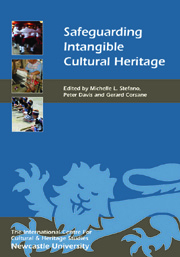Book contents
- Frontmatter
- Contents
- List of Illustrations
- Acknowledgments
- Touching the Intangible: An Introduction
- NEGOTIATING AND VALUING THE INTANGIBLE
- APPLYING THE INTANGIBLE CULTURAL HERITAGE CONCEPT
- ON THE GROUND: SAFEGUARDING THE INTANGIBLE
- 14 Acquiring the Tools for Safeguarding Intangible Heritage: Lessons from an ICH Field School in Lamphun, Thailand
- 15 Intangible Threads: Curating the Living Heritage of Dayak Ikat Weaving
- 16 Conversation Piece: Intangible Cultural Heritage in South Africa
- 17 Revitalising Amerindian Intangible Cultural Heritage in Guyana and its Value for Sustainable Tourism
- 18 When ICH Takes Hold of the Local Reality in Brazil: Notes from the Brazilian State of Pernambuco
- 19 Reconfiguring the Framework: Adopting an Ecomuseological Approach for Safeguarding Intangible Cultural Heritage
- 20 Conversation Piece: Intangible Cultural Heritage in Italy
- 21 Looking to the Future: The en-compass Project as a Way Forward for Safeguarding Intangible Cultural Heritage
- List of Contributors
- Index
20 - Conversation Piece: Intangible Cultural Heritage in Italy
from ON THE GROUND: SAFEGUARDING THE INTANGIBLE
Published online by Cambridge University Press: 05 February 2013
- Frontmatter
- Contents
- List of Illustrations
- Acknowledgments
- Touching the Intangible: An Introduction
- NEGOTIATING AND VALUING THE INTANGIBLE
- APPLYING THE INTANGIBLE CULTURAL HERITAGE CONCEPT
- ON THE GROUND: SAFEGUARDING THE INTANGIBLE
- 14 Acquiring the Tools for Safeguarding Intangible Heritage: Lessons from an ICH Field School in Lamphun, Thailand
- 15 Intangible Threads: Curating the Living Heritage of Dayak Ikat Weaving
- 16 Conversation Piece: Intangible Cultural Heritage in South Africa
- 17 Revitalising Amerindian Intangible Cultural Heritage in Guyana and its Value for Sustainable Tourism
- 18 When ICH Takes Hold of the Local Reality in Brazil: Notes from the Brazilian State of Pernambuco
- 19 Reconfiguring the Framework: Adopting an Ecomuseological Approach for Safeguarding Intangible Cultural Heritage
- 20 Conversation Piece: Intangible Cultural Heritage in Italy
- 21 Looking to the Future: The en-compass Project as a Way Forward for Safeguarding Intangible Cultural Heritage
- List of Contributors
- Index
Summary
Can you say something about yourself and your personal interest in ICH?
Since 1982 I have been a researcher within a government organisation, the Istituto Ricerche Economico Sociali del Piemonte, based in Turin, Northern Italy. Within this organisation, which is a section of the Piedmont regional government, I have focused to a large extent on local development and its relationship with the natural environment and heritage resources. Exploration of these kinds of relationships necessarily involves consideration of the concept of intangible heritages, including how they relate to economics. Intangible heritages are very important to the economy because of their connections to, for example, environmental quality and a sense of community; people need to feel secure, have a sense of well-being, develop their creativity and a sense of trust. All of these factors are related to social capital and I feel that these ‘invisible’ aspects of community life affect visible economic phenomena. Like distant planets on a cloudy night, we are not always able to observe them directly, but we cannot ignore their impact on the heavens.
In Italy, the state bureaucracy ‘owns’ – or at least has responsibility for – almost the entire natural and cultural heritage. At the national level then, heritage is regarded as a concept mainly connected with material things. However, the regional governments and associated institutions, who own very little, are more open-minded on the matter of ICH. Hence, the cultural background of the regional research institute in which I work is a favourable environment for due consideration of the documentation, safeguarding and transmission of intangible heritage.
- Type
- Chapter
- Information
- Safeguarding Intangible Cultural Heritage , pp. 239 - 246Publisher: Boydell & BrewerPrint publication year: 2012



